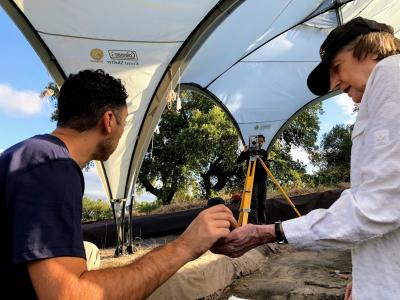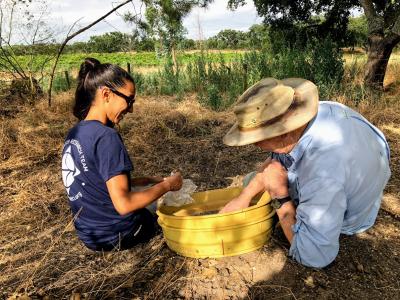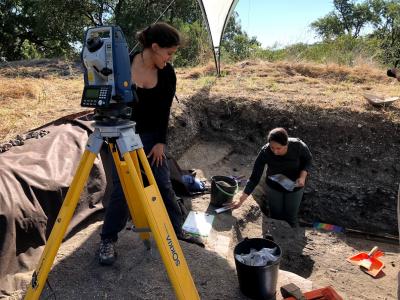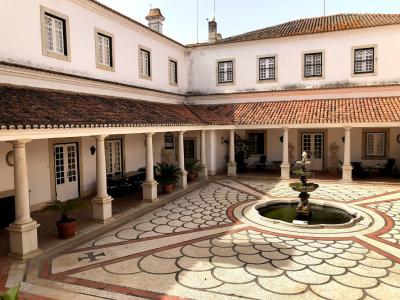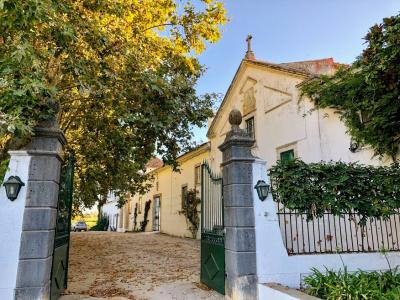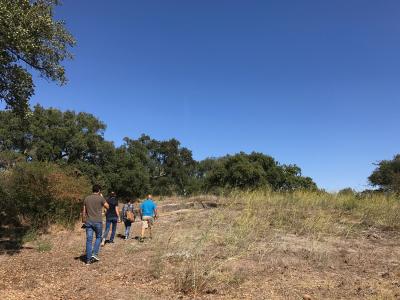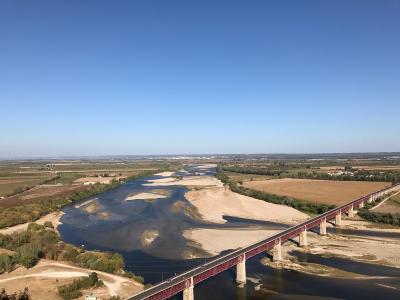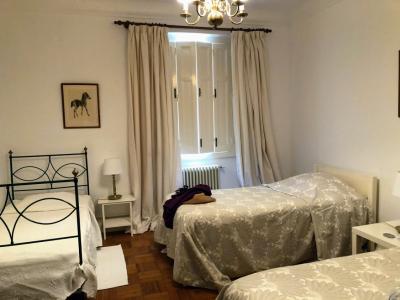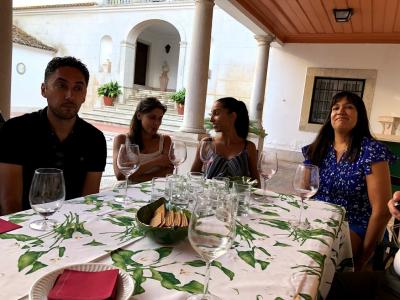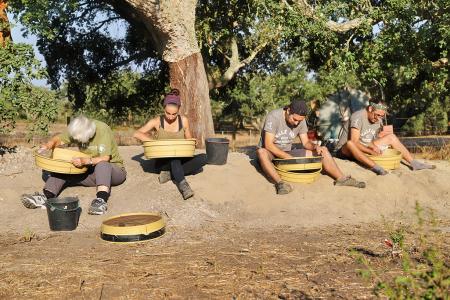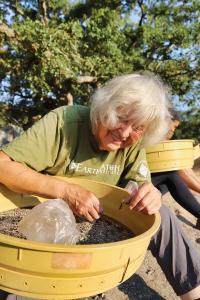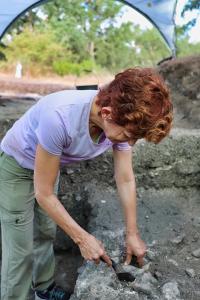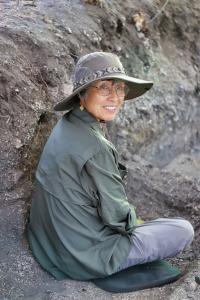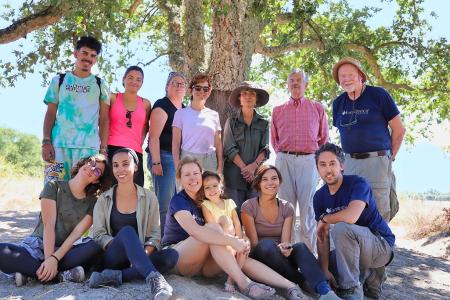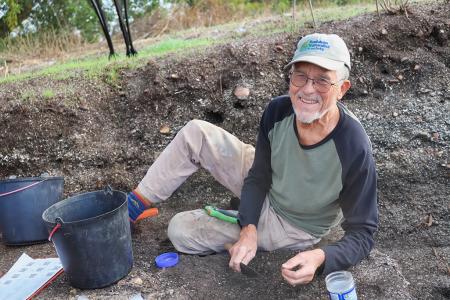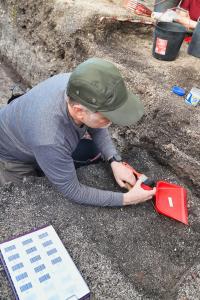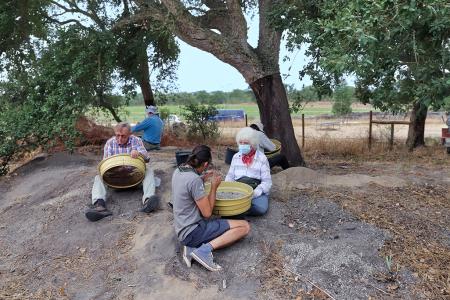Please read the following information carefully before leaving for your expedition.
Discovering Ancient Societies in Portugal
Expedition Briefing
Quick Navigation: COVID-19 Safety | The Research | Research Aims | How You Will Help | Life in the Field | Accommodations and Food | Project Conditions | Essential Eligibility Requirements | Health and Safety | Project Risks and Precautions | Travel Planning | Additional Resources
Click on the images to view full size!
COVID-19 Safety
You are strongly encouraged to test for COVID-19 before traveling to your expedition, particularly if you are experiencing symptoms. Do not travel if you have tested positive, and call Earthwatch right away for the next steps. Please see earthwatch.org/covid-19 for more information.
The Research
Around 8,000 years ago, Central Portugal underwent a dramatic shift in lifestyles from hunting and gathering to farming and herding (e.g., Bailey and Milner, 2002; Erlandson, 2001; Renouf, 1998). Globally, this transition was much more than a mere shift in where food came from. It was a change in the way people lived on the land, which, in turn, allowed them to stay in one place longer than previously possible. That led to shifts to more permanent housing, the emergence of true villages, and increased social structure. In short, this transition is about when we became “us.”
Usually thought of as one culture (the “more advanced” agriculturalist) replacing another (the “more primitive” hunter/ gatherers), there is increasing evidence to suggest these cultural systems existed at the same time and place (Bicho et al., 2013; Price, 2015).
The Mesolithic-Neolithic transition remains one of the most controversial issues in prehistory archaeology, attracting significant archaeological debate and extensive research. The common-held belief is that hunter-gatherers disappeared from Central Portugal around 7,000 years ago, and later, farmers and herders settled in the area. But now, archaeologists are uncovering clues contradicting this.
By analyzing bone tools, shells (and other evidence of food types consumed), ornaments, and human remains, researchers will trace the transition between these periods to better understand the complex changes not only in technology and subsistence but also in how people thought about themselves and the world around them, as well as the nature of their social interactions.
Due to its diversity of artifact assemblages, excellent faunal and human bone preservation, evidence for multiple site functions, and the presence of a newly discovered wet context (e.g., Bokelmann, 2012; Conneller et al., 2009; Milner et al., 2011) Cabeço da Amoreira and Cabeço da Arruda are an ideal location to study the Mesolithic hunter-gatherers and their probable integration into the newly arrived exogenous Neolithic societies coming from the Mediterranean Sea. At the same time, researchers will be looking to understand potential climatic drivers that have precipitated this shift and the impact of these food-producing societies on the natural environment, regional ecology, and cultural background.
Discovering Ancient Societies in Portugal
Research Aims
Researchers seek to understand how individuals changed culturally and physically, how tools and technologies changed during this time, and how burial practices, rituals, and land use differed between the Mesolithic and Neolithic populations.
Researchers have already discovered several sets of human burials at the project site—key findings that have provided insights into the genetic continuity at the Mesolithic-Neolithic transition, enabling a better understanding of past human diets and mobility.
The goals of understanding and defining the Mesolithic-Neolithic transition process in the region are grounded in providing answers to the following set of research questions:
- Is it possible to identify cultural and physical alterations in the local population based on DNA and diet? And how are these possibly related to population movement and integration?
- Was there a differential use among Mesolithic and Neolithic populations (e.g., burial contexts, funerary rituals, prestige items, and land use)?
- What were the changes and/or continuities in technology?
- How did the apparent changes in subsistence strategies impact social changes and the regional ecology?
Discovering Ancient Societies in Portugal
How You Will Help
Citizen scientists will be involved in both excavation and laboratory activities, including the following tasks:
Excavation:
- digging
- total station and data recording
- software operation
- sediment screening
- sample collection
Laboratory Activities:
- washing, sorting, and labeling archaeological materials
- data entry and management
- floatation and processing of paleobotany samples
Specialists in different research areas will conduct sample analysis during laboratory work hours. Citizen scientists are encouraged to watch and experiment with these tasks. All processes will be accompanied by in-depth explanations of their importance to the project and the preservation of past cultural heritage.
On some teams, volunteers may also help develop educational materials and participate in public lectures and other outreach activities to raise awareness about the project and the importance of prehistoric archaeology.
Discovering Ancient Societies in Portugal
Life in the Field
Each day, the team will rise early and prepare for the field. After breakfast, everyone will be driven to the research site to receive a daily briefing regarding the activities to be carried out that day—both in the field and at the laboratory.
DAILY ACTIVITIES
Weather and research needs can lead to changes in the daily schedule. We appreciate your cooperation and understanding.
Excavation activities will take place during the morning, from 7:30 a.m. to 12:30 p.m. During the excavation, participants are encouraged to ask questions about the materials and techniques used. Occasionally, the team may be joined by local university and high school students who are there to learn. You will receive training on the activities and the basic tools and software used daily.
After morning fieldwork, participants will return to the accommodations, where they will prepare their lunches using the provided supplies. Following this short rest break, the team will walk about 5 minutes (approx. 100 meters) to the laboratory for afternoon work.
There will be time to rest, socialize, and discuss the day’s work in the evenings. Most nights, the team will enjoy dinner at a local restaurant (chosen in advance by field staff). On a couple of evenings, the group will dine on-site at the palace (pizza night or similar!
ITINERARY
For One-Week Teams:
- Day 1: Arrival in the afternoon, project orientation, and dinner
- Days 2: Basic training, safety briefing, and orientation to field sites; begin fieldwork.
- Days 3–5: Excavation and laboratory work
- Day 6: Fieldwork and evening wrap-up for the first week of work
- Day 7: Depart for the airport.
For 13-Day Teams:
- Day 1: Arrival in the late afternoon, project orientation, and dinner
- Days 2: Basic training, safety briefing, and orientation to field sites; begin fieldwork.
- Days 3–11: Excavation and laboratory work. One day will be spent exploring a nearby town or visiting the vineyard on a recreational day.
- Day 12: Fieldwork and evening wrap-up
- Day 13: Depart for the airport.
POLICIES
There is no smoking at the project site, only in designated areas.
Discovering Ancient Societies in Portugal
Money Matters
Local Currency: Euro (EUR)
Personal Funds: Visa and Mastercard are commonly accepted in Portugal. Should you wish to participate in optional recreational activities that may be offered (such as wine tasting at Casa Cadaval), you will need to budget some personal funds to cover this. A tasting experience costs approximately 25 Euros.
Discovering Ancient Societies in Portugal
Accommodations and Food
* Please note that not every expedition has couples’ or singles' accommodations available. Please call or email Earthwatch to check availability before reserving your space(s) on the team.
SLEEPING
Earthwatch teams will stay at the Palace of Muge Estate (also known as ‘Casa Cadaval’), the historic home on the property where the research site is located. In the palace, rooms will be shared between two volunteers of the same gender, and teams will share multiple bathrooms in one wing of the home. There may be rooms available for pairs with advanced notice. Sheets, towels, pillows, and blankets will all be provided. A small table fan is provided, but please note that the palace rooms are not air-conditioned.
The family estate is home to Teresa Schonborn, Countess of Schonborn, and Wiesentheid, the House's Chairman of the Board of Directors. Countess Teresa Schonborn is a friend and colleague of the research team, a project collaborator, and passionate about archeology. The home is a private residence and a historical landmark. This housing is a truly special and unique experience.
* Earthwatch will honor each person’s assertion of gender identity respectfully and without judgment. For both teen and adult teams, where logistics dictate single-sex accommodations or other facilities, participant placements will be made in accordance with the gender identity the participant specified on their Earthwatch Participant form and/or preferences indicated in discussions with Earthwatch.
BATHROOMS
The bathrooms are shared and have conventional flush toilets and hot showers.
PERSONAL COMMUNICATIONS
All participants with international plans can be reached through mobile phones at any time. Because mobile networks are available at the sites, e-mail and Skype can also be used.
All project staff are equipped with mobile phones with a mobile network.
Please note: Earthwatch encourages volunteers to minimize outgoing calls and immerse themselves in the experience; likewise, family and friends should restrict calls to urgent messages only. Emergency communications will be prioritized.
DISTANCE TO THE FIELD SITE
The distance between the accommodations and the field site is very short, with travel time less than 10 minutes by van. The laboratory facilities are about a 5-minute walk (approx. 100 meters) from the accommodations.
FOOD AND WATER
The teams will eat local Portuguese cuisine, including fresh items. Soups and stews are typical due to the presence of ancient convents and monasteries where they originate. Volunteers will prepare their breakfasts, lunches, and snacks at the accommodations. Drinking water will be provided. Fresh fruits and energy bars are available for snacks. Dinner will be arranged at local restaurants or in the palace courtyard.
TYPICAL MEALS
The following are examples of foods you may find in the field. Variety depends on availability. We appreciate your flexibility.
- Breakfast: Bread, cheese, eggs, spreads (peanut butter), fresh fruit, coffee, tea
- Lunch: Sandwiches, deli meat, cheese, spreads (peanut butter), canned fish, vegetable salads, soft drinks
- Dinner: Meat, grilled fish, fresh vegetables, a variety of stews and soups
- Desserts: Local Portuguese desserts
- Beverages: Water, coffee, juice, soft drinks
SPECIAL DIETARY REQUIREMENTS
Please alert Earthwatch to any special dietary requirements (e.g., diabetes, lactose intolerance, nut or other food allergies, vegetarian or vegan diets) as soon as possible and note them in the space on your volunteer forms.
Vegetarians and lactose intolerant diets can be accommodated on this project if volunteers are flexible. Vegan diets and kosher diets are rather difficult to accommodate. If you have a special diet, it is recommended that you bring some supplemental snacks.
Discovering Ancient Societies in Portugal
Project Conditions
The following information is as accurate as possible, but please remember that conditions may change.
The project area is Lezíria Ribatejana, located on the plain of the Tagus River.
The Ribatejo region, where Muge shell middens are located, is a transition zone between two major ecosystems: Atlantic (to the north) and Mediterranean (to the south). Because of this ecosystem complexity, the region is home to diverse flora and fauna. The native vegetation of this area is usually cork-oak woods, myrtles, and shrubs of oaks. Grape vines dominate. However, other species are also present, including olive and fruit trees (e.g., pear, apple, quince, peach, orange, lemon, and fig). The herbaceous vegetation mainly comprises ruderal and nitrophilous species typical of agro-ecosystems. Trees surround the site, and it is not unusual to see local fauna wandering around—including small herbivores like rabbits or hares, birds of prey and herons, and farm animals that live on the property (cows, horses, and donkeys).
GENERAL CONDITIONS
Please visit Wunderground.com and search for your project location for weather and region-specific information.
Summer wildfires impact mainland Portugal on an annual basis. All participants are advised to monitor local media for wildfire warnings to avoid dangerous areas while traveling in Portugal. You may track updates to high-risk areas using the Risk Level Map. To view the project site region in this map, select the Santarém District and the county of Salveterra de Magos. Should there be any foreseen impacts on your expedition, you will be notified by Earthwatch.
Discovering Ancient Societies in Portugal
Essential Eligibility Requirements
All participants must be able to:
- Tolerate average temperatures of 84–91°F/29–33°C at the day's peak with low humidity. Daily high temperatures may exceed 104°F (40°C) on occasion.
- Enjoy being outdoors all day in all types of weather (see above), in the potential presence of wild animals and insects.
- Traverse short distances of mostly flat terrain to reach research sites.
- Walk, possibly in sand or uphill with a light pack, up to 1 mile/1.6km per day.
- Bend and kneel to get low enough to access the ground for digging and troweling in the sediment several times daily and kneeling for extended periods.
- Handle a trowel to sift through sediment, and lift and carry a bucket of sediment weighing about 10–15 lbs./4.5–7 kgs. Note: Sifting work requires some agility to get up and down off the ground in the sandy substrate (good balance needed).
- Carry personal daily supplies such as snacks, water, and some small field equipment weighing 10 lbs./4.5 kgs or less.
- Get up and down from a van and ride, seated with a seatbelt fastened, for about 30 minutes daily.
- Be able to go up and down the stairs to get to the accommodations (all guest rooms are located on the second floor).
- Follow verbal and/or visual instructions independently or with the assistance of a companion.
- Take an active role in one’s safety by recognizing and avoiding hazards if and when they arise (including, but not limited to, those described in Earthwatch materials and safety briefings). Always comply with project staff instructions and recommended safety measures.
- Be able to effectively communicate to the staff if experiencing distress or need assistance.
- Be able to get along with a variety of people from different backgrounds, often in close proximity, for the duration of the team.
- Be comfortable being surrounded by a language and/or culture that is not your own.
Discovering Ancient Societies in Portugal
Health and Safety
EMERGENCIES IN THE FIELD
Earthwatch has a 24-hour, 7-day-a-week emergency hotline number. Someone is always on call to respond to messages that come into our live answering service.
IMMUNIZATIONS & TRAVEL VACCINATIONS
Please be sure your routine immunizations are up to date (for example, diphtheria, pertussis, tetanus, polio, measles, mumps, rubella, and varicella) and that you have the appropriate vaccinations for your travel destination. Medical decisions are the responsibility of each volunteer and their doctor. Visit the Center for Disease Control and Prevention or the World Health Organization for guidance on immunizations.
If traveling from countries or regions where yellow fever is endemic, you must have a certificate of vaccination.
It is strongly encouraged that you stay up to date with your COVID-19 vaccinations, including receiving booster doses, as applicable.
Discovering Ancient Societies in Portugal
Project Risks and Precautions
TRANSPORTATION
As in any country, transport is a risk. All vans and cars will be fitted with seatbelts, and all passengers must wear them whenever the vehicle is in motion. Only experienced drivers will drive vehicles. Each vehicle will contain a first-aid kit and a cell phone for communication. Participants may not drive, even their own cars, during the project.
WALKING
Participants are required to engage in demanding physical activities, including walking over uneven terrain. Project staff will review the participants’ physical abilities and adjust the group's pace as much as possible to accommodate their needs. Due to the variable terrain, individuals with severe mobility restrictions may not be able to be accommodated.
CLIMATE/WEATHER
The region can be very hot in August and September. Temperatures average 84–91°F/29–33°C at the peak of the day but can occasionally exceed 104°F (40°C). The evenings are cooler, with temperatures dropping to around 63º–69ºF/17º–20ºC. Participants must be able to tolerate long periods of sun exposure during the summer months. Participants should take measures to avoid dehydration and sun exposure, such as drinking water throughout the day, covering up with full-length trousers and shirts, and wearing sunglasses and a hat with a generous brim.
Wildfires are common in Portugal in the summer months; however, the national civil protection system has made significant strides in improving its firefighting capabilities and implementing preventive measures. Participants will be instructed on evacuation routes in the event of a fire at the accommodations or field sites. All participants are advised to monitor local media for wildfire warnings to avoid dangerous areas while traveling in Portugal. You may track updates to high-risk areas using the Risk Level Map. To view the project site region in this map, select the Santarém District and the county of Salveterra de Magos.
DEHYDRATION
Participants will be reminded to drink plenty of water throughout the day and to bring at least two liters of water into the field each day; to wear high-factor sunscreen and appropriate clothing, including sunglasses and a wide-brimmed hat; to not overwork when jet lagged or tired, and to inform a staff member when feeling tired or ill. The team will always take regular breaks as needed and monitor participants for general health.
ANIMALS & PLANTS
Due to the area's large number of trees, plants, and insects, we advise citizen scientists who suffer from pollen/insect allergies to bring appropriate medication. Information will be provided before the program to ensure proper medical awareness, and a prior review of allergies listed in participant forms will be undertaken by field staff. A diverse array of wild animals inhabits the Santarém region, most harmless. While encounters with wild animals are relatively rare, it is crucial to be cautious when exploring the region's woodlands, respecting wildlife habitats, and maintaining a safe distance. Remember, appreciating wildlife from a distance and promoting conservation efforts are essential for a harmonious coexistence between humans and the diverse animal species of the region.
PROJECT TASKS/EQUIPMENT
Instruction will be provided on proper excavation technique and proper inspection of equipment to ensure safety. Adequate protective personal equipment (i.e., work gloves, face masks, etc.) should be provided by each participant. The project will provide kneeling pads for participant use.
RISK OF COVID-19 OR OTHER RESPIRATORY ILLNESS
Earthwatch strongly encourages you to take precautions to help protect yourself and others from common viral respiratory illnesses, including COVID-19, flu, and RSV: stay up to date with your vaccinations; wash your hands frequently; take steps to improve air quality, for example, by increasing ventilation indoors or gathering outdoors; and use preventative measures to limit the spread if you are sick.
Persons with a higher risk of severe respiratory illness should consult their healthcare provider before participating.
Discovering Ancient Societies in Portugal
Travel Planning
RENDEZVOUS LOCATION
Lisbon Humberto Delgado Airport is also known as Lisbon International Airport or Portela Airport, Lisbon, Portugal.
* Earthwatch will provide additional information to meet your team. Please do not book travel arrangements such as flights until you have received further information from Earthwatch.
ABOUT YOUR DESTINATION
Earthwatch strongly recommends that travelers investigate their destination before departure. Familiarity with the destination’s entry/exit requirements, visas, local laws, and customs can ensure smooth travel. The U.S. Department of State's Traveler’s Checklist and Destination Guides are helpful resources. For LGBTI travelers, the U.S. Department of State's LGBTI Travelers page contains many helpful tips and links.
COUNTRY AND PROJECT ENTRY REQUIREMENTS
You are responsible for reviewing and abiding by your destination's entry/exit requirements.
Entry visa requirements differ by country of origin, layover, and destination and do change unexpectedly. For this reason, please confirm your visa requirements at the time of booking and again 90 days before travel. Please apply early for your visa (we recommend starting six months before the start of your expedition). Refunds will not be made for volunteers canceling due to not obtaining their visa in time to meet the team at the rendezvous. You can find up-to-date visa requirements at travisa.com.
If a visa is required, participants should apply for a TOURIST visa. Please note that obtaining a visa can take weeks or even months. We strongly recommend using a visa agency to expedite and simplify the process.
Discovering Ancient Societies in Portugal
Resources
ARTICLES
- Aldeias, V. and Bicho, N. (2016). Embedded behavior: human activities and the construction of the Mesolithic shellmound of Cabeço da Amoreira, Muge, Portugal. Geoarchaeology, 31(6), 530-549. https://onlinelibrary.wiley.com/doi/10.1002/gea.21573
- André, L. and Bicho, N., (2016). Perforation techniques and traces of use on the Mesolithic adornments of the Trench area at Cabeço da Amoreira Shellmidden (Muge, central Portugal). Comptes Rendus Palevol 15, 569-580. https://www.sciencedirect.com/science/article/pii/S1631068315002201
- Bicho, N., (1994). The end of the Paleolithic and the Mesolithic in Portugal. Current Anthropology 35 (5), 664-674. (researchgate.net)
- Bicho, N., Cascalheira, J., Gonçalves, C., Umbelino, C., García Rivero, D. and André, L., (2017). Resilience, replacement, and acculturation in the Mesolithic/Neolithic transition: The case of Muge, central Portugal. Quaternary International 446, 31-42. https://www.sciencedirect.com/science/article/abs/pii/S1040618216304359
- Bicho, N., Cascalheira, J., Marreiros, J., Gonçalves, C., Pereira, T. and Dias, R., (2013). Chronology of the Mesolithic occupation of the Muge valley, central Portugal: The case of Cabeço da Amoreira. Quaternary International 308-309, 130-139. https://www.sciencedirect.com/science/article/abs/pii/S1040618212032934
- Bicho, N., Umbelino, C., Detry, C. and Pereira, T., (2010). The Emergence of Muge Mesolithic Shell Middens in Central Portugal and the 8200 cal yr BP Cold Event. The Journal of Island and Coastal Archaeology 5, 86-104. https://www.tandfonline.com/doi/abs/10.1080/15564891003638184
- Gonçalves, C. Cascalheira, J. and Bicho, N., (2014). Shellmiddens as landmarks: visibility studies on the Mesolithic of the Muge valley (central Portugal). Journal of Anthropological Archaeology 36, 130-139. https://www.sciencedirect.com/science/article/abs/pii/S0278416514000713
- Gonçalves, C., Cascalheira, J., Costa, C., Bárbara, S., Matias, R. and Bicho, N. (2018). Detecting single events in large shell mounds: A GIS approach to Cabeço da Amoreira, Muge, Central Portugal. Journal of Archaeological Science: Reports 18, 1000-1010. https://www.sciencedirect.com/science/article/abs/pii/S2352409X1730473X
- Taylor, R., García Rivero, D., Gonçalves, C., Cascalheira, J. and Bicho, N. (2021). The Early Neolithic at the Muge Shellmiddens (Portugal): Analysis and Review of the Ceramic Evidence from Cabeço da Amoreira. European Journal of Archaeology 24(2), 156-179. https://www.cambridge.org/core/journals/european-journal-of-archaeology/article/abs/early-neolithic-at-the-muge-shellmiddens-portugal-analysis-and-review-of-the-ceramic-evidence-from-cabeco-da-amoreira/A42F960331E644626D077735639A875A
- Umbelino, C., Curate, F., Perinha, A., Ferreira, T., Cunha, E. and Bicho, N. (2019). Cortical bone loss in a sample of human skeletons from the Muge Shell middens. Archaeological and Anthropological Sciences 11(2), 455-467. https://link.springer.com/article/10.1007/s12520-016-0402-4
BOOKS
- Bicho, N., Detry, C., Price, D. and Cuha, E. (editors). (2015). Muge 150th: The 150th Anniversary of the Discovery of the Mesolithic Shellmiddens: Volumes I and II. Newcastle upon Tyne: Cambridge Scholars Publishing. https://www.cambridgescholars.com/product/978-1-4438-8007-7
PROJECT-RELATED WEBSITES
LITERATURE CITED
- Bailey, B. and Milner, N. (2002). Coastal hunter-gatherers and social evolution. Before farming, 3-4, 1–15.
- Bicho, N., Cascalheira, J., Marreiros, J., Gonçalves, C., Pereira, T. and Dias, R. (2013). Chronology of the Mesolithic occupation of the Muge Valley, central Portugal: The case of Cabeço da Amoreira. Quaternary International 308-309, 130–139.
- Bokelmann, K. (2012). Spade paddling on a Mesolithic lake—Remarks on Preboreal and Boreal sites from Duvensee (Northern Germany). In: M.J. Niekus, R.N. Barton, M. Street and Th. Terberger (eds.), A Mind Set on Flint: Studies in Honour of Dick Stapert. Elde, Barkhuis, pp. 369–380.
- Conneller, C., Milner, N., Schadla-Hall, T. and Taylor, B. (2009). The temporality of the Mesolithic landscape: new work at Star Carr. In: P. Crombé, V. Strydonck, M. Sergant, M. Boudin and M. Bats (eds.), Chronology and Evolution within the Mesolithic of North-West Europe: Proceedings of an International Meeting, Brussels, May 30th–June 1st, 2007. Newcastle upon Tyne, Cambridge Scholars Publishing, pp. 77–94.
- Erlandson, J.M. (2001). The archaeology of aquatic adaptations. Journal of Archaeological Research 9, 287–350.
- Milner, N., Conneller, C., Elliott, B., Koon, H., Panter, I., Penkman, K. and Taylor, M. (2011). From riches to rags: organic deterioration at Star Carr. Journal of Archaeological Science 38(10), 2818–2832.
- Price, T. (2015). Tracing Past Human Movement: An Example from the Muge Middens. In: N. Bicho, C. Detry, T. Price and E. Cunha (eds.), Muge 150th: The 150th Anniversary of the Discovery of Mesolithic Shellmiddens. Cambridge Scholars Publishing, Newcastle upon Tyne, pp. 225–234.
- Renouf, M. (1988). Sedentary coastal hunter-fishers: an example from the Younger Stone Age of northern Norway. In: G. Bailey and J. Parkington (eds.), The Archaeology of Prehistoric Coastlines. Cambridge, Cambridge University Press, pp. 102–115.
Discovering Ancient Societies in Portugal
Sign up for the Earthwatch Newsletter
Be the first to know about new expeditions, stories from the field, and exciting Earthwatch news.
.
.
.
